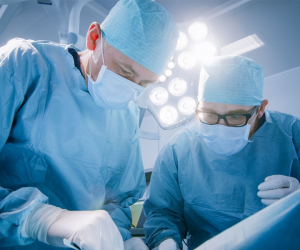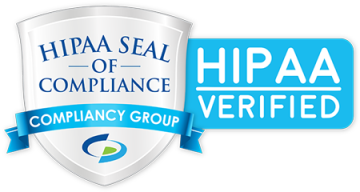Thyroid Nodules
Thyroid nodules are oval, round-shaped lumps in the thyroid gland, a butterfly-shaped organ in front of the neck. While there is always a risk for a thyroid nodule to be due to underlying cancer, the majority of thyroid nodules do not pose any significant harm to a patient’s health.1 In most people, they are incidentally discovered during a routine physical exam by their healthcare provider.
Since most patients do not experience any symptoms with benign thyroid nodules, treatment is usually unnecessary. However, a doctor might decide to treat the nodule once a patient starts experiencing symptoms. Some patients might also want the nodule removed for aesthetic reasons. Until recently, surgery was considered the only viable treatment option for thyroid nodules. But now less invasive treatment options like radiofrequency ablation is now available.
Surgical Thyroidectomy
Thyroidectomy refers to the surgical removal of some or all parts of the thyroid gland. The surgeon will decide to remove either a part or the entire thyroid gland depending on the extent of the disease. If a nodule is confined to just one lobe of the thyroid gland, then only a part of the thyroid would be removed. However, if there is a more extensive disease as in the case of cancer or large nodules, the entire thyroid gland may need to be removed.
The surgery is performed through a horizontal incision in the neck, from left to right. The surgeon identifies the part of the thyroid that needs to be removed. The wound is later closed with sutures or clips.2Usually a drain is also left in the neck
temporarily to drain excess fluid and blood. Patients might need to take life-long thyroid hormone pills after the surgery. This is because the thyroid hormones will no longer be produced by the body once the thyroid gland has been removed.3
Thyroid Radiofrequency Ablation (RFA)
Radiofrequency ablation is a less-invasive technique that uses heat generated by radiofrequency waves to destroy tissues. This therapy is not new and was used by Interventional Radiologists for treatment of lung cancers over 10 years ago. It is still currently used for some lung and liver cancers. For thyroid nodules, only recently did interventional radiologists start offering this as a treatment option. Now there are many studies showing this an effective treatment option for patients with benign thyroid nodules.4
During the procedure, the doctor inserts a needle-like electrode into the thyroid nodule. Ultrasound can help in the correct identification of the nodule. Once the probe is placed, the heat generated from the radio waves leads to tissue destruction and cell death. This ultimately shrinks the nodule. As the procedure can be uncomfortable, the doctor will use a local-numbing agent around the nodule before the ablation. Unlike surgery, patients do not require treatment with thyroid hormone after radiofrequency ablation. There are no surgical drains needed and there are no sutures or incisions. Some side effects of radiofrequency ablation include swelling, bruising, and soreness.5
Surgical Thyroidectomy vs Radiofrequency Ablation
Surgical thyroidectomy has traditionally been used to treat benign thyroid nodules. However, recent studies highlight significant advantages of radiofrequency ablation over surgery. There is less risk of hypothyroidism (“thyroid hormone deficiency”) and other complications following radiofrequency ablation. Some of the complications that might result from surgical thyroidectomy include hoarseness of voice, damage to surrounding nerves, and bleeding. In addition, studies suggest that patients treated with surgery can have a long hospital stay, versus an outpatient RFA procedure.
Another advantage of radiofrequency ablation is that it can be very effective for the removal of small thyroid nodules. Surgery can be unnecessary and even traumatic in those situations. There is also minimal scarring following radiofrequency ablation as there is no incision, which makes it a good option for patients that are concerned about their appearance. RFA is well-tolerated and should be used as a first-line option for the majority of patients with benign thyroid nodules. However, surgical thyroidectomy still has its place in the management of other thyroid nodules.7
Why California Thyroid Center?
Our physician is one of only a few RFA specialists specifically trained in ultrasound-guided procedures performing over 2,000 procedures yearly of different parts of the body. As a double-board certified imaging specialist, he has received 6 years of post-graduate training with specialization in ultrasound guided procedures and ablations, which requires a 3D spatial understanding while viewing a 2D image. In comparison, most other RFA specialist trained by taking a weekend course and only perform 20-100 ultrasound guided procedures yearly.
Our specialist performs ablation of not only the thyroid but more complex organs such as cancers of the kidney, liver and lung. These more complex organs require a higher level of skill and understanding of the ablative technology to prevent damage to nerves, bowel and nearby organs. This has allowed many of our patients to undergo the thyroid RFA procedure safely by our specialist with outstanding results, no matter the complexity.
Our practices uses the top RFA system by STARmed. This system was developed over 15 years ago, used worldwide and has perfected the ability to treat thyroids. The STARmed probes are also small and unique in allowing the procedure to be done without making any incisions, minimizing scarring.

What do you need to do next?
Request an appointment to meet with our RFA specialist who will review your imaging, labs and history to determine if you are a good candidate for the procedure, and the outcomes you can expect. Each person is an individual and should discuss the potential risks and benefits of thyroid RFA with our doctor to decide if this is the best option.
Appointments are available via an online video telehealth platform or in person in Los Angeles, California. Why should you choose us? Read here.
- Grani G, Sponziello M, Pecce V, Ramundo V, Durante C. Contemporary thyroid nodule evaluation and management. J Clin Endocrinol Metab [Internet]. 2020;105(9):2869–83. Available from: https://academic.oup.com/jcem/article/105/9/2869/5850848
- Cirocchi R, Trastulli S, Randolph J, Guarino S, Di Rocco G, Arezzo A, et al. Total or near-total thyroidectomy versus subtotal thyroidectomy for multinodular non-toxic goiter in adults. Cochrane Database Syst Rev [Internet]. 2015;2015(8):CD010370. Available from: http://doi.wiley.com/10.1002/14651858.CD010370.pub2
Miccoli P, Materazzi G, Rossi L. Levothyroxine therapy in thyrodectomized patients. Front Endocrinol (Lausanne) [Internet]. 2020;11:626268. Available from: https://www.frontiersin.org/articles/10.3389/fendo.2020.626268/full
- Tufano RP, Pace-Asciak P, Russell JO, Suárez C, Randolph GW, López F, et al. Update of Radiofrequency ablation for treating benign and malignant thyroid nodules. The future is now. Front Endocrinol (Lausanne) [Internet]. 2021;12:698689. Available from: https://www.frontiersin.org/articles/10.3389/fendo.2021.698689/full
- Muhammad H, Santhanam P, Russell JO, Kuo JH. RFA and benign thyroid nodules: Review of the current literature. Laryngoscope Investig Otolaryngol [Internet]. 2021;6(1):155–65. Available from: https://onlinelibrary.wiley.com/doi/10.1002/lio2.517b
- Bernardi S, Dobrinja C, Fabris B, Bazzocchi G, Sabato N, Ulcigrai V, et al. Radiofrequency ablation compared to surgery for the treatment of benign thyroid nodules. Int J Endocrinol [Internet]. 2014;2014:934595. Available from: http://www.hindawi.com/journals/ije/2014/934595/
The above information explains what is involved and the possible risks. It is not meant to be a substitute for informed discussion between you and your doctor, but can act as a starting point for such a discussion.










